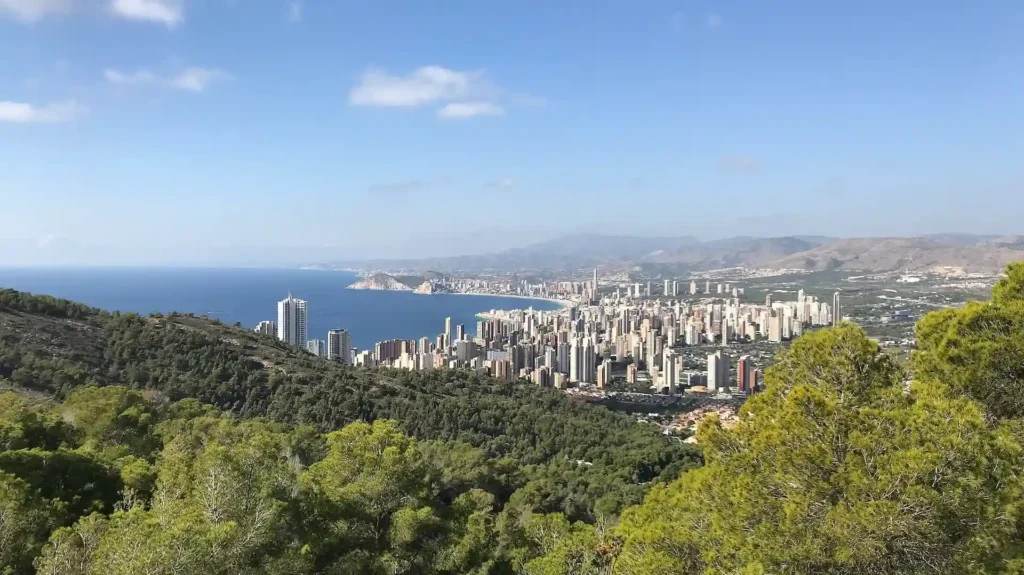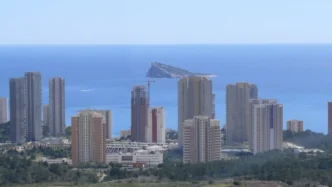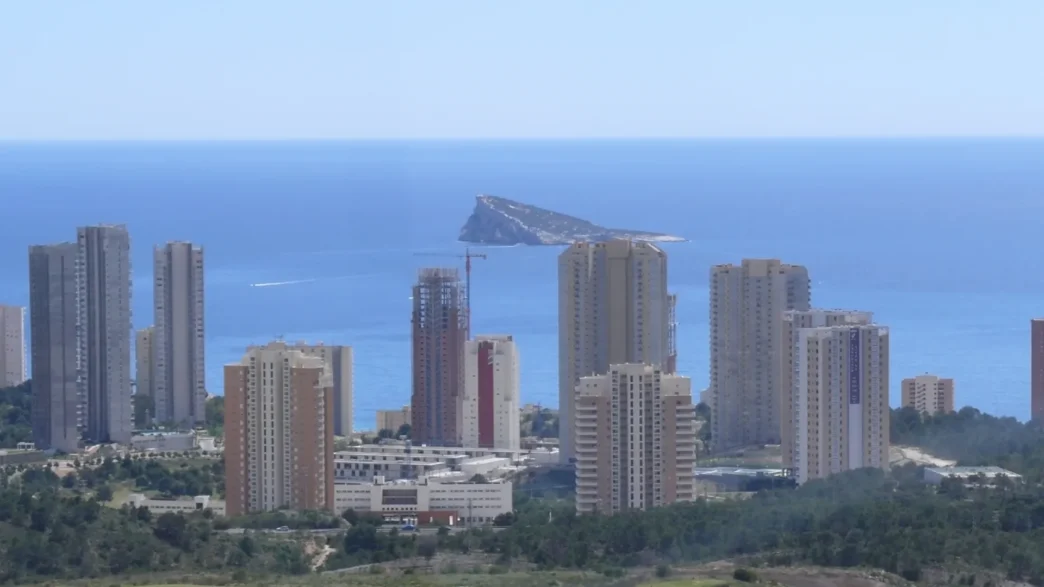Supreme Court Confirms Historic Payout
Benidorm, Spain — Spain’s leading tourist city is facing its gravest financial challenge in decades. The Supreme Court has upheld a ruling by the Valencian High Court (TSJ) ordering Benidorm City Council to compensate the Murcia Puchades development group with more than €330 million over a failed urban planning agreement linked to Serra Gelada, the mountain range declared a natural park in 2005.
The ruling, delivered by the Administrative Chamber of the Supreme Court, confirms that the city must pay in cash after failing to honor a 2003 agreement—extended in 2010 and 2013—that promised alternative building rights to the developers.
- €283M principal compensation
- €61M in accrued interest
- Total: €344M liability
This figure is 2.6 times Benidorm’s annual budget of €124 million, raising the specter of technical bankruptcy for Spain’s mass-tourism capital.
Benidorm Faces Financial Collapse After Supreme Court Ruling
For a city of just 75,000 registered residents—but home to more than 300,000 people year-round and up to two million visitors each August—the ruling could reshape its future for decades.
“This sentence represents a technical bankruptcy for the municipality,” warned Cristina Escoda, socialist spokesperson in Benidorm’s city council. “It will mortgage the future of several generations and severely compromise the public services our citizens and millions of tourists rely on.”
A confidential financial report, attached to the city’s appeal to the Constitutional Court, described the payout as a “grave disruption” that could devastate municipal finances and essential services.
Murcia Puchades Group Presses Benidorm for Serra Gelada Compensation
For Francisco “Quico” Murcia Puchades, former president of the Valencian developers’ association, the ruling vindicates a legal battle spanning two decades. His companies, Murcia Puchades Expansión SL and Urban Villajoyosa 2000 SL, once held urban rights in the APR-7 sector of Serra Gelada.
“All we have asked successive city governments is to honor the agreement signed in 2003,” said his lawyer, José Domingo Monforte, in comments to El Confidencial. “Since compensation was not delivered in land, the judgment enforces the valuation rules established back then. Legally, the ruling is impeccable.”
Still, Monforte stressed that the developers are open to negotiations: “Our willingness has always been to sit down and avoid unnecessary harm. We don’t know what kind of negotiation may be possible, but it must respect the 2003 agreement.”
Political Blame Game Erupts Over Benidorm €330M Land Dispute
The dispute has reignited political tensions in Benidorm. The opposition Socialist Party (PSOE) argues that current mayor Toni Pérez (Popular Party, PP) bears direct responsibility.
“Pérez voted in favor of the 2003 agreement as a councillor, and later supported its extensions in 2010 and 2013,” Escoda said. “Now he tries to shift blame, but the truth is he was part of the problem from the start.”
Pérez, who also presides over Alicante’s provincial government, insists the city still has legal options. “We are not yet at the procedural point of having to meet that liability,” he told reporters, pointing to ongoing cases aimed at annulling the original agreements.
Two lower court rulings have already sided with the municipality by declaring the agreements null and void, though both remain under appeal. “Our decisions have always been backed by municipal experts, the Consell Jurídic Consultiu, and courts of first instance,” Pérez argued.

Benidorm’s Land Shortage Complicates Serra Gelada Settlement
Even if negotiations take place, Benidorm faces a fundamental obstacle: lack of municipal land. Surrounded by the Mediterranean and neighboring towns such as Finestrat and Alfàs del Pi, the city’s geography has left little space for expansion.
Potential assets include:
- Levante area plots: part of a stalled 575,000 m² urban expansion plan.
- Industrial & commercial land: earmarked for development but stuck in planning delays.
- Municipal reserve plots: limited in number and often unsuitable.
Despite its dense skyline and massive tourist economy, Benidorm’s tax base reflects only its small resident population. To raise funds, Pérez introduced a 23% property tax hike and a 72% increase in waste collection fees in 2023, while continuing to reject a tourist tax—a measure opposed by hotel operators.
What Comes Next for Benidorm
The Supreme Court ruling has cast a shadow over Benidorm’s urban planning strategy and financial stability. Unless the Constitutional Court suspends the order, the city could face:
- Years of austerity measures
- Suspension of urban projects
- Reduced public services
- Heightened political conflict
The PSOE is demanding accountability. “This is the largest financial penalty ever imposed on a Spanish municipality,” Escoda said. “Toni Pérez must take responsibility, apologize, and resign.”
The PP counters that the opposition is exploiting the crisis. “The PSOE never objected to the legal strategy advised by municipal services,” argued Lourdes Caselles, councilor for urban planning. “They agreed with every step in council meetings and cannot now disown their role.”
A €330 Million Question Over Benidorm’s Future
For now, Benidorm’s fate hangs in the balance. As tourists sip beer on Levante Beach terraces and retirees stroll under the Mediterranean sun, few notice the looming fiscal storm.
Yet above the glittering skyline of hotels and skyscrapers hangs a question that could define the city’s next decade:
How will Benidorm pay for Serra Gelada?
Information Source:
https://www.elconfidencial.com
Photo Attribution:
Skyline of Benidorm by Ad Meskens, via Wikimedia Commons, licensed under CC BY-SA 3.0.
Parque natural de Serra Gelada, Benidorm (2017-10-15)” by Triplecaña. Source: Wikimedia Commons Licensed under CC BY-SA 4.0
 English
English Español
Español












